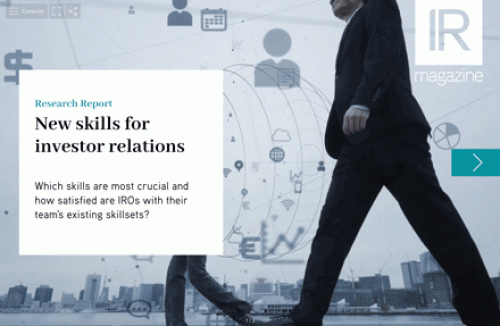IR Magazine is proud to introduce its new editorial board. It is made up of 12 seasoned investor relations professionals from across the world, each working at companies in different sectors and of varying cap sizes, but with one thing in common: a passion for pursuing excellence in the profession.
Over the coming weeks, we will be introducing you to each of our board members, who will be working alongside IR Magazine to advise our editorial team about emerging trends, themes and issues facing the profession around the world. You may also hear from them on the IR Voice podcast or on our videos and you might read their words in our weekly Editor’s Picks newsletter.
This week, we hear from Ricardo Jiménez Hernández, strategic adviser at Harmon and a former director of investor relations at Ferrovial, where he oversaw a tumultuous time in the company’s history during which time its share price fell 80 percent. Below, he tells us more about the most challenging period in his investor relations career and his love of playing Spanish guitar.
How would you sum up your approach to IR in three words?
To build trust.
What’s been the biggest IR challenge of your career?
In 2006, Ferrovial launched a hostile bid for BAA on the London Stock Exchange. BAA was the company that owned the UK’s seven major airports, including London Heathrow and London Gatwick. The deal had a market value of €25 bn ($27 bn), more than double Ferrovial’s market capitalization, and was 95 percent debt-financed, reflecting the times.
There were two main risks: one geopolitical – a possible terrorist attack that would disrupt the airports’ operations – and one financial, a possible closure of the debt markets. Both risks materialized over the next 12 months.
With more than €30 bn of debt on its balance sheet and interest rates rising, Ferrovial was the most indebted industrial company in Europe. Part of the debt was secured by shares in another listed company, Ferrovial’s subsidiary Cintra, and the covenants were linked to Cintra’s share price.
Ferrovial’s chairman was also heavily in debt, having bought back some of his shares from other members of the founding family, with debt linked to Ferrovial’s share price. The markets smelled blood and Ferrovial was the short favorite in Europe. The share price fell from €19 to €4, a drop of 80 percent.
British newspapers constantly accused Ferrovial of mismanaging Heathrow, an airport that had suffered from decades of underinvestment. On the other hand, the British regulator had declared BAA to be a monopoly and forced the sale of several airports in 2009, resulting in significant losses. In the words of the Financial Times, ‘complex maneuvers by a complex company at a complex time’.
Ferrovial had to implement a program of operational improvements at Heathrow to fix the fundamentals, as well as a major divestment plan. It was a program the market thought impossible. But it worked and over the next seven years the share price rose from €4 to €23. Having attracted the world’s leading sovereign wealth funds to invest in the airport, Ferrovial recently announced its final exit from the investment. Heathrow is now recognized as one of the best airports in the world.
What would you have done if you hadn’t gone into corporate finance?
There are many different types of jobs in corporate finance, and investor relations is just one of them. There are always opportunities to work in the financial world, which is usually much better paid than working in an industrial company. If I hadn’t made it, I think I would have worked in marketing. I probably would have had more free time to learn Spanish guitar, one of my favorite hobbies.










